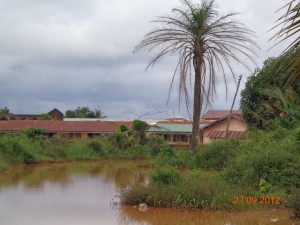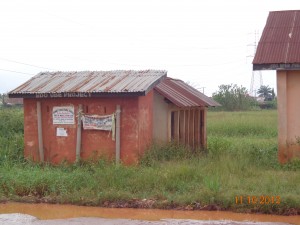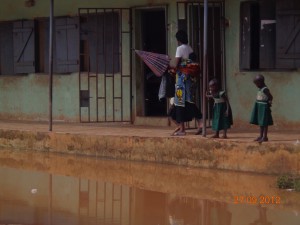It was around 10 in the morning that day. Abies (not her real name) has just been asked out of the class. She had been down with illness and has not been in school for about a week and half now. Her peasant mother said the nurses at the health centre, (not too far, from the school premises) had diagnosed stubborn malaria. But it looks like there is more to it than meets the eyes.
 Abies managed to show up in school today but, midway between her classes, she began to throw up. The “Arithmetic Auntie” (as the subject teacher is fondly addressed) had asked the six-year-old girl to go out of the class so as not to vomit inside the jam-packed classroom, and avoid the possibility of infecting the other pupils.
Abies managed to show up in school today but, midway between her classes, she began to throw up. The “Arithmetic Auntie” (as the subject teacher is fondly addressed) had asked the six-year-old girl to go out of the class so as not to vomit inside the jam-packed classroom, and avoid the possibility of infecting the other pupils.
She had barely reached the corridor when her bosom friend and playmate, Kate (not her real name), also in Primary 2, met her in an unusual position and gestures, and became curious.
“Your belle dey pain you?” kate queried her friend in pidgin English, meaning “Is your belly aching?’’ But Abies was busy battling for her life. She held her stomach a second time and in a split second resumed her vomiting. “Doe o!” Kate quipped in vernacular, meaning “Sorry!”
“Your belle dey pain you?” she asked a second time, inquisitively. “No. E dey turn me and I dey feel cold,” Abies managed to reply at last but instantly resumed the battle for her health. Just then my camera’s lenses clicked to record the ensuing drama from my (investigative) “hide out”.
There is an apparent state of emergency here! The rains this year have refused to stop and the daily misery, environmental/health hazards and pains borne by inhabitants and indigenes of this large community and their immediate neighbours in Egor Local Government Area (LGA) in Edo State, Nigeria, are now a normal ritual and culture of sorts; and if the predictions by environment and climate change experts are anything to be taken serious, next year’s rains and its resultant flooding , erosion menace and health havoc should be worse than this year’s experience – just as this year’s rains and its resultant floods have eclipsed the 2011 flood furies in this part of the state.
 Alas! Here at Evbuotubu Community, the worst hit victims are school children, and unless something urgent and drastic is done now by all relevant stakeholders, the partially submerged school buildings may soon collapse on the helpless children and their teachers. Or, at least, an imminent epidemic might break out sooner or later. Why? How?
Alas! Here at Evbuotubu Community, the worst hit victims are school children, and unless something urgent and drastic is done now by all relevant stakeholders, the partially submerged school buildings may soon collapse on the helpless children and their teachers. Or, at least, an imminent epidemic might break out sooner or later. Why? How?
Minutes earlier, I was heading to the office of the headmistress of the second arm of the school, to book an appointment. The office was in the middle of a block of four classrooms, and walking across the two three classrooms to her office was very revealing. Dutiful teachers were busy teaching and writing on the black boards or marking books on their tables while enthusiastic kids – some of whom sat on the muddy wet floor for want of chairs to sit on – listened with rapt attention while others were too busy copying notes to notice a visitor’s presence by the corridor.
As I approached the door of the school head, pungent smell filled the air around me. I looked around the erosion-ravaged premises and the large pools of water around, looking for any dead animal in the flood water. Just then I noticed at the extreme end of the building – about half a pole from the school head’s office – an abandoned school latrine overtaken by weeds and flood water (obviously out of use because of the erosion, the flood may have washed ashore the faeces inside the abandoned latrine onto the surface).
“Good morning, everybody,” I politely greeted two elderly ladies chatting away in the office. “Please is this the headmistress’ office?” The fair lady seated at the far end of the room immediately responded in affirmation and reciprocated my greeting in a friendly and receptive manner, while her dark complexioned colleague seated by my right hand just kept starring at me as if I was a tax collector or some sort of an “area boy”.
“I am a journalist, and also a resident of this community. I used to have my child in this school but she has passed out…” I began introducing myself and my mission. “I have been greatly concerned about the state of things in this school for a long time now but I decided to come and see what I can do to help draw the attention of those concerned in government to the plight of children in this school, even though I know there may have been various efforts regarding this in the past…”
“Did you say your child is in this school?” the fair lady queried me.
 “She used to be in this school but she passed out two years ago and now she is schooling in Asoro Grammar school,” I corrected her, and continued: “I wanted to see the headmistress to seek the cooperation of the school authority to carry out some research and investigation on the way this yearly flooding is impacting daily on the pupils and their academics, and to ask a few questions regarding what the school has done or is doing to make the government speed up efforts to keep its promise.”
“She used to be in this school but she passed out two years ago and now she is schooling in Asoro Grammar school,” I corrected her, and continued: “I wanted to see the headmistress to seek the cooperation of the school authority to carry out some research and investigation on the way this yearly flooding is impacting daily on the pupils and their academics, and to ask a few questions regarding what the school has done or is doing to make the government speed up efforts to keep its promise.”
While her mate just kept looking at me as though waiting to cross-examine me, the fair lady cut in, “Oh that’s good. You’re welcome. The headmistress just left some minutes ago to her office in town but she will soon be back. You can still speak with her (pointing to the dark lady), she’s the vice.”
My God! The same woman who has refused to give me a welcome look or say anything to me was the very one I have to speak to! I turned and looked in her direction.
“You’re a journalist, what kind of cooperation are you expecting from us?” she asked in a rather intimidating and suspicious manner.
“Well, I would like the school authority to permit me to observe the experiences of the school children under this heavy flooding they learn in and to take some photographs, ask you people a few questions – like how is the daily flooding of the school premises affecting the children and teachers academically and health-wise? Are mosquitoes and other insects affecting the pupils and teachers in the classes as a result of the flooding? Is the situation affecting the attitude input of teachers to work as well as their health? All these will help me in my report about what is going on here in this school,” I explained.
“Have you been in this community or you just came newly?” the lady queried me again. I was yet to answer when she dropped a bombshell, “You see that I have been very reluctant to talk all this while, because it’s like you’re a stranger here. You see, I’m somebody that doesn’t like wasting my time in what will never work”. At this point I became confused and curious. Is she implying I’m on a futile mission?
“Madam, how do you mean? I politely asked. Then she opened up: “If you are old in this community you will know that the main problem of this school is the community and their leaders. In all my 33 years as a teacher I have been transferred to several communities. I have never seen a community that hates to develop. Here you have a problem that has deteriorated for several years, and yet you couldn’t do anything about it as a community, instead you are adding to the problems. All they are good and fast at is recklessly selling lands without considering the impacts on the land. They keep selling off lands indiscriminately.”
She continued, “Anywhere in the world whenever you want to sell community lands, you first of all consider three basic things: you consider school, market and hospital – these basic essential needs of the people. But here, the community leaders and the people don’t care about all of these provided they get money.
“And you were asking me you want to find out if mosquitoes bite pupils and if teachers are comfortable working under this condition. I think such a question should not arise at all. From my little knowledge of elementary science, we were taught the various reproduction stages of mosquitoes breeding and multiplying and we were taught that pools of standing water is the breeding ground for mosquitoes, how much more this river and lake of erosion that has taken over the entire school compound for several years. So, I’m surprised that such a question is coming from an enlightened person like you, a journalist for that matter. You also talked about how it is affecting teachers … you can see me now, I’m sitting here with hands folded. Because I’m feeling cold and you don’t have to be told that a major part of the reason is because the entire premises is filled with water. What do you expect? Anyway, we are willing to give you the cooperation you asked for but the headmistress, as you have been told, is not around now. Except you wait or come back another time.”
The deputy headmistress may be right: as I later got to discover, the flooding situation at the Evbuotubu Primary School has entered its 12th year, but there is nothing to show that help is in sight for these children. Year after year, they learn under mosquitoe-infested environment. Their entire school premises have been taken over by flood and bushes. They have no access to drinking water, no functional latrine and no playing field for recreation. The negative impact of the situation on the health and academic output of both teachers and students are underscored by the recurrent cases of malaria and other water-related diseases such as Abies and many other children in the school daily have to contend with.
Alas! Who really cares?
By Francis Odupute
